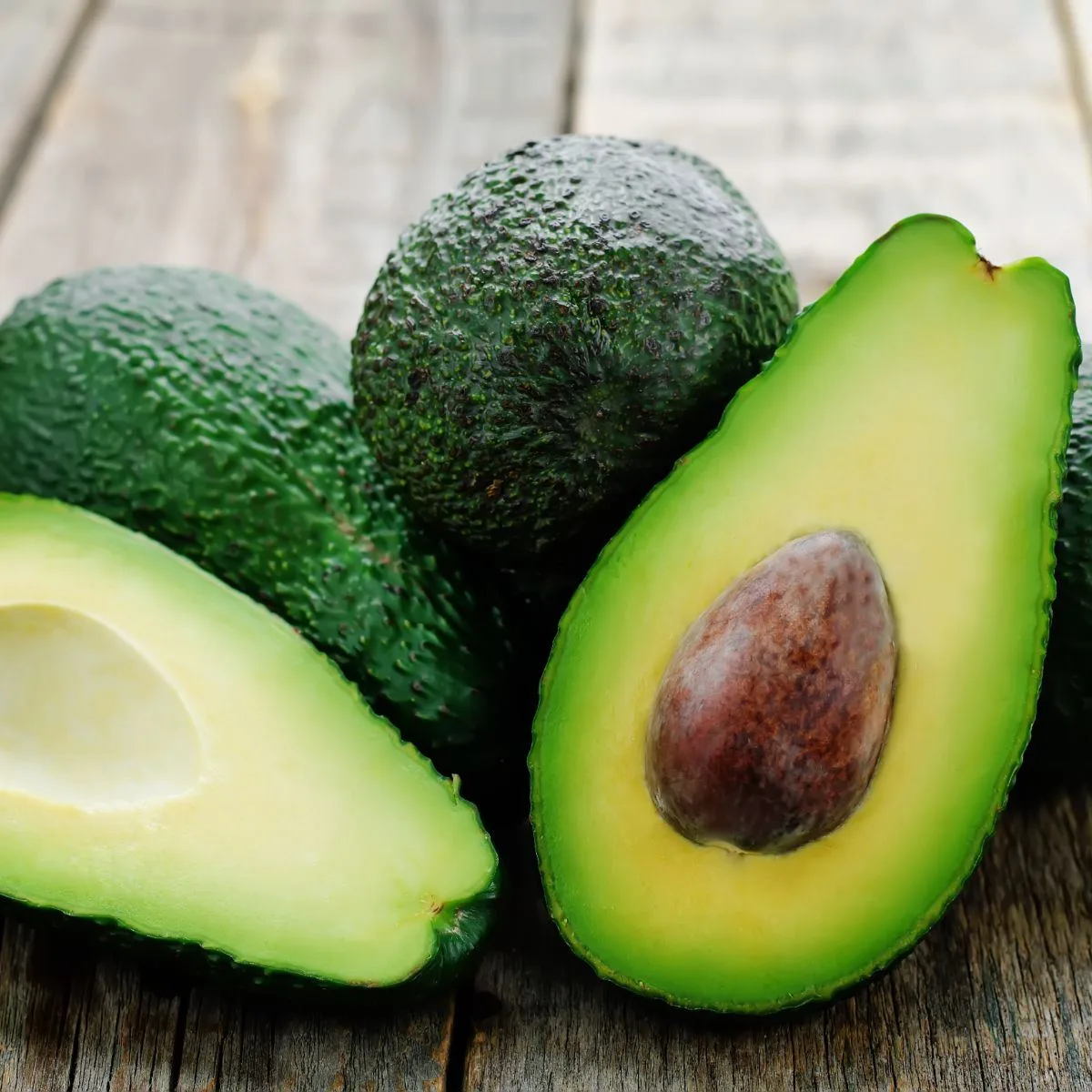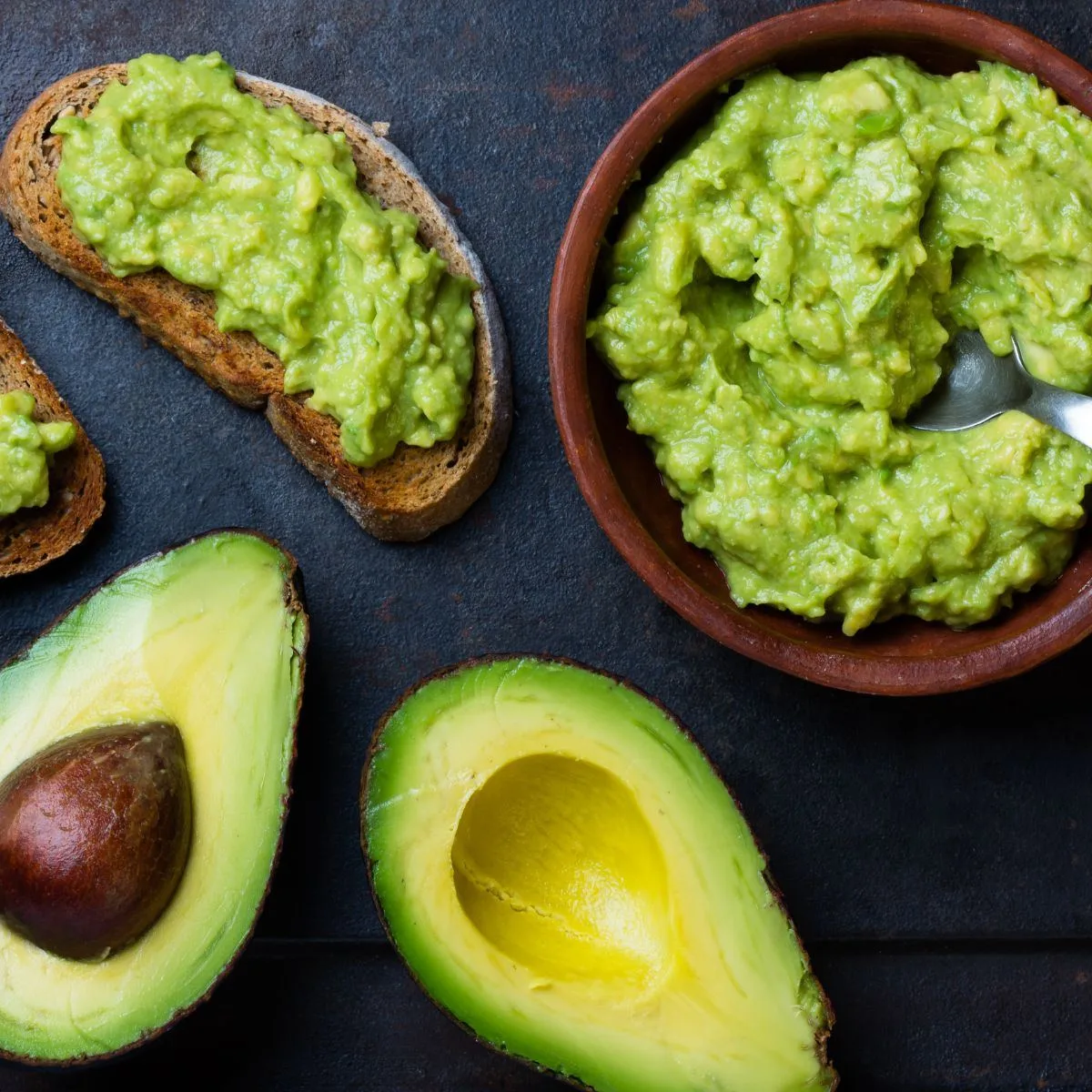Avocado is an interesting fruit, with a very low carbohydrate content (it’s not sweet), but rich in healthy fats and fiber.
Originally from Central America, avocado is now grown in all hot or Mediterranean climates.
Avocado is a fruit that belongs to the Lauraceae family, along with other flowering plants such as camphor, cinnamon or bay leaves.
The pulp’s buttery consistency and specific taste of the avocado make it similar to oleaginous fruits, nuts, and seeds. The scientific name of this fruit is Persea Americana.
Avocado fruit becomes dark green or dark purple when ripe, while its inside has a woody brown seed. Each fruit weighs about 300-700 g.
Practical Advice
Choose fruits without bruises, blemishes, and scratches.
If ripe, its surface has to be soft just a little.
If it is too soft, it is not good.
If it is underripe and hard, it means that you will need to ripe it at home.
To ripen avocados at home, put them in a paper bag with an apple or a banana.
Leave it for a day or two, and you will notice that it is ripe.
It is a perishable fruit, and therefore it is better to consume it quickly after peeling.
It is not recommended to freeze avocado dishes.
After cutting it in half, in order to last longer, sprinkle with plenty of lemon juice and keep it in the fridge.
If you still see black parts in the pulp, remove them and eat only the yellow-greenish side.
Peel it as close to the fruit as possible, because there we find a high concentration of antioxidants and vitamins.
It is a fatty fruit, with an atypical taste, reminiscent of green nuts.
If it’s bitter, it means it is not ripe yet.
You can use it as such or in salads, sauces, paste, and fruit mixtures.
READ MORE: Alkaline Diet – Foods
Health Benefits Of Avocados
Experts recommend those who follow a low protein diet, to replace it with increased consumption of healthy fats, such as those found plenty in avocado, coconut oil, olives, olive oil, butter, or nuts.
An avocado contains about 22.5 grams of fat, of which two-thirds are monounsaturated (beneficial for health).
An important quality of avocados is that they contain very little fructose and about 20 essential nutrients such as fiber, potassium (in a double amount in comparison to bananas), vitamin E, B vitamins, and folic acid.
Due to a large number of substances that promote our body’s health, it is easy to see why avocados have such a long list of benefits, once introduced into our diet:
- have strong antioxidant properties, contributing to preventing the onset of various types of cancer;
- have the ability to protect the liver against cirrhosis and hepatitis, according to Japanese researchers, in a study coordinated by Professor Hirokazu Kawagishi;
- contain certain compounds that inhibit and destroy oral cancer cells;
- help increase the good cholesterol levels in the body (HDL) and lower the bad (LDL) as well as triglycerides in the blood;
- maintain cardiovascular health, due to its vitamin B6 and folate, two substances that adjust homocysteine levels (compound associated with an increased risk of heart disease); as they contain vitamin E, glutathione, and monounsaturated fat, avocados protects the heart and sustain cardiac activity;
- are a good source of potassium, a mineral that helps keep blood pressure under control. Potassium helps prevent hypertension, heart disease, or heart failure;
- protect healthy cells of the body from free radicals, with the help of the phytonutrients (polyphenols and flavonoids) provided and thus lowering the risk of developing inflammatory and degenerative diseases;
- improve eyesight, using the carotenoid called lutein (which prevents and inhibits macular degeneration associated with aging and cataracts);
- adjust blood sugar levels and control diabetes by reducing insulin resistance in the body, with the help of healthy fats and soluble fiber contained;
- prevent birth defects (neural tube defects or Spina Bifida), thanks to the folate contained (250 g of avocado ensures pregnant women 23% of the recommended daily dose of folate);
- reduce the risk of stroke, due to the content of folate (studies have shown that this substance has proven to be useful in preventing concussions);
- prevent prostate and breast cancer, as they are rich in oleic acid, a compound that inhibits the development of malignant tumors in the two organs;
- delay the aging process of the body, due to the antioxidants in composition (especially glutathione), which boost the immune system, protect cells and balance the nervous system’s functions;
- fights against halitosis, cleaning the intestinal system and adjusting a number of toxins in the body, as well as removing the dry mouth phenomenon;
- increase the body’s ability to absorb important nutrients for good eyesight and healthy skin, especially carotenoids (beta-carotene and lycopene);
- help treat various dermatological diseases (psoriasis in particular) due to its significant hydration effect on the skin;
- beautify skin and hair, giving them brightness and vitality (this is why avocados are used in many cosmetic masks);
- help underweight people gain weight in a healthy and harmonious way (100 g of avocado contains 200 calories), developing muscle tissue and not fatty tissue;
- maintain the health of the digestive system due to insoluble (75%) and soluble (25%) fiber content; insoluble fiber cleans the colon and prevents constipation and colorectal cancer, while the soluble fiber adjusts appetite (prolonging the feeling of fullness more than other foods);
- increase bone density due to its rich content in vitamin K (thus, preventing osteoporosis and helping children’s skeletal system develop optimally);
- boost metabolism due to vitamin B complex;
- not only are they a good source of monounsaturated fatty acids, including oleic acid, which was proven to protect against breast cancer, but they are also a good source of lutein. Moreover, they contain significant amounts of carotenoids (zeaxanthin, alpha-carotene, beta-carotene) plus tocopherols (vitamin E);
- help prevent memory loss and acceleration of mental illness in patients diagnosed with Alzheimer’s, because they are a rich source of vitamin E, a substance that stimulates the protein forming process and which neutralizes free radicals that destroy brain cells.
READ MORE: Facts You Didn’t Know About Hemp
Introducing this fruit into your diet
Avocados can be used raw, as such, or in salads, seasoned with salt and pepper, maple syrup, and various herbs and spices.
They can also replace the fats used in cooking (substituting oil, butter, etc).
Avocados can be used as dessert as well, in various cake recipes or protein shakes prepared in the blender.
All this makes the avocado an ideal fruit in your diet, which is worth using at least once a week.
READ THIS NEXT: Pistachio Benefits For Skin
References https://news.llu.edu/research/llu-professor-says-avocados-may-not-be-pits https://hhd.psu.edu/nutrition/cardiometabolic-lab/avocado-study

Sunday 2nd of August 2015
Nice one
Saturday 10th of October 2015
very nice